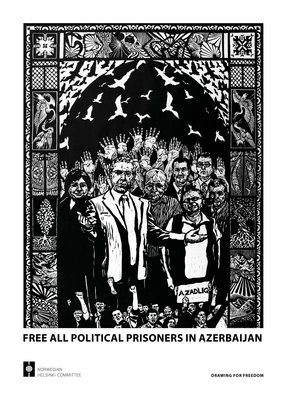President Aliyev’s occasional pardoning decrees, leading to the release of hundreds of prisoners, clearly highlight the arbitrary nature of justice in this country. President has de-facto authority to keep a detainee in prison forever. Forget about the courts, which were themselves emasculated long ago into kangaroo courts that can never dare to release anyone that the President wanted in prison. The courts receive direct instructions from government officials to invent justifications to keep political prisoners incarcerated despite their straightforward eligibility for the immediate acquittal.
President Aliyev’s self-glory was often exercised to subject political enemies and critics to total surrender and prostration of jailed opposition politicians that the President knew personally. Take the case of prominent opposition politician Ilgar Mammadov, who has been in jail for more than four years, imprisoned because President Aliyev saw him as a political threat. Mammadov had the courage to want to stand against Aliyev in 2013’s presidential election. When he made clear his intention to run as a candidate, he immediately found himself convicted on a ludicrous charge of inciting riots. Mammadov faced constant threats and pressure from the prison administration to ask for presidential clemency for his alleged crime. They promised Mammadov that he would be released in exchange of pleading humiliating clemency. He steadfastly rejected, saying he has no repentance for crimes which he never committed in the first place. He has 3 more years to be set free, unless the authorities arbitrarily extend prison sentences.
Youth activist Ilkin Rustamzade has also been jailed for more than 4 years, in connection with a series of pro-democracy protests held in early 2013. Outspoken journalist Seymur Hazi has been in prison for 3 years, on the old Soviet catch-all charge of “hooliganism”. The list goes on, with the revolving prison door in Azerbaijan keep spinning again and again.
Among the released include Abdul Abilov and Elvin Abdullayev, the social media activists, never should have been imprisoned in the first place. Their critical posts in Facebook on human rights abuses and corruption had caused their arrest. Others are Rufat Zahidov and Rovshan Zahidov, the relatives of the exiled chief editor of major opposition newspaper, Ganimat Zahid. The Zahidovs’ cases brazenly illustrate how the authorities arbitrarily target individuals because of the known political and critical activities of their relatives and with the apparent aim of compelling activists to stop their work.
All these 4 pardoned individuals had been met with accusations of drug crimes, which fit squarely into a well-established pattern of Azerbaijan’s authorities using false, politically-motivated drug charges to punish activists. Drug charges are just a part of the government’s spiteful tool box of punishments for those who speak out against it or its policies.
Those who regain their freedom live under a shadow. For instance, Intigam Aliyev (no relation to president Aliyev), a respected human-rights lawyer, was released from prison in March 2016, but still faces a travel ban and excessive fine for bogus “tax evasion” charges.
At the same time as some critics are let out, however, others are tossed inside. Elkhan Isgandarov, senior member of the embattled “Muslim Unity public movement” were arrested on yesterday- on the day of pardoning decree, and faces various controversial charges including inciting religious hatred, organizing mass unrest, and illegal possession of weapons. The Movement’s dozens of members are in jail since late 2015 and all had alleged that police severely ill-treated them in detention to coerce confessions and testimony against others.
Any release of political prisoners would be welcomed, but it can never be a sign of unstiffening of President Aliyev’s ossified autocracy. Pardoning and releasing the detainees for sins uncommitted do not serve to exercise justice, but blatantly display self-serving magnanimity of the President. Although the government hails the pardon an act of “humanity” and “gesture of goodwill”, it happens against a backdrop of ongoing severe human rights abuses and many activists languishing in the jails of Azerbaijan.
To avoid falling for the same trick all over again, no one – especially Azerbaijan’s international partners – should be fooled by these superficial pardons and the trumped-up convictions against peaceful activists, who pay heavy price in a repressive environment that imprisons and tortures anyone who dares to champion a democratic alternative.
This article by Vugar Gojayev was first published at NHC campaign site www.nopoliticalprisoners.org
